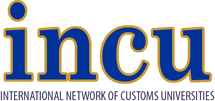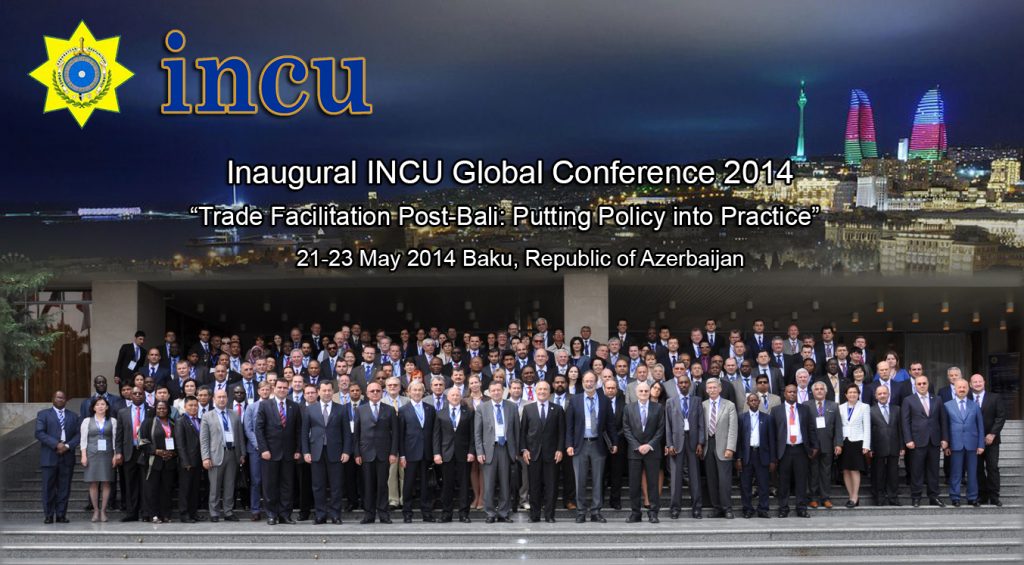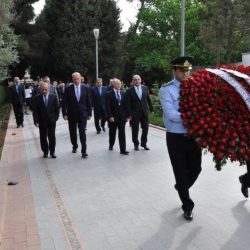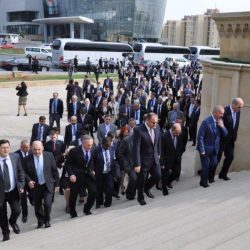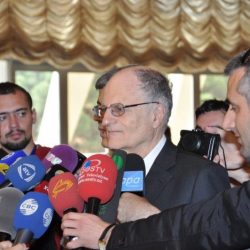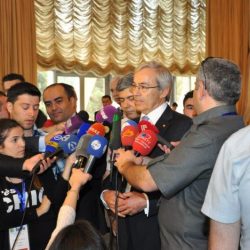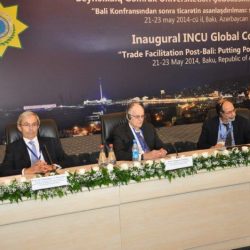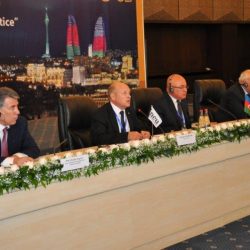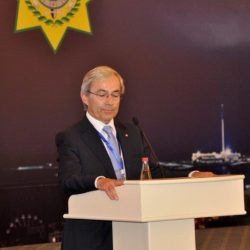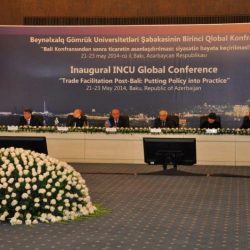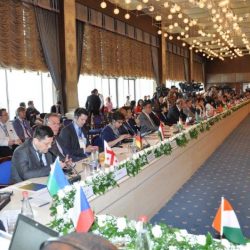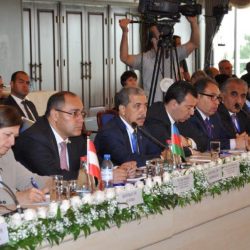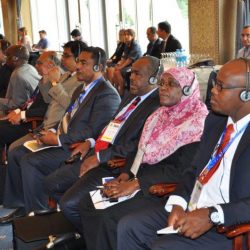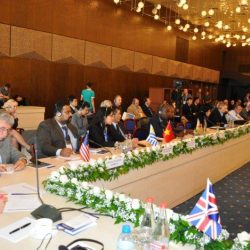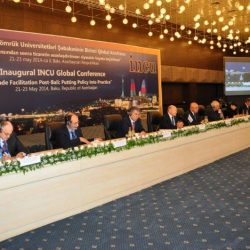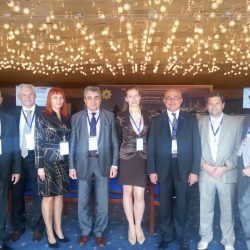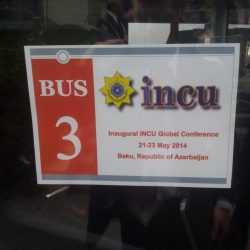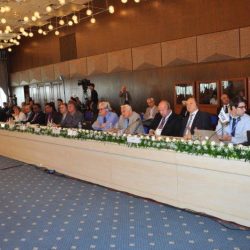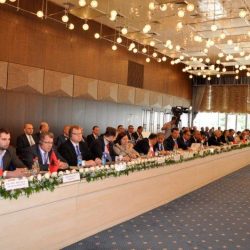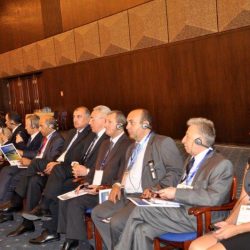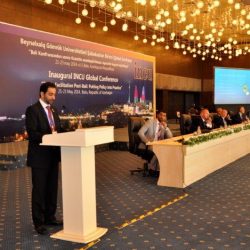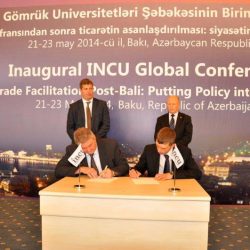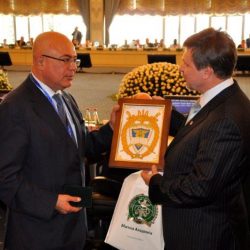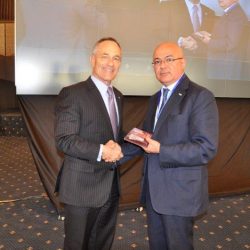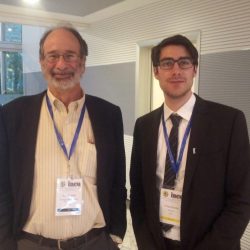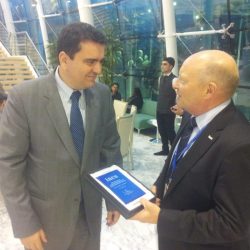“Trade Facilitation Post-Bali: Putting Policy into Practice”
The International Network of Customs Universities (INCU) and the State Customs Committee of the Republic of Azerbaijan delivered the Inaugural INCU Global Conference 2014 which took place from 21 to 23 May 2014 in Baku, Republic of Azerbaijan.
Conference Summary
For some time the International Network of Customs Universities (INCU) has worked closely with the World Customs Organization (WCO) through its PICARD (Partnership in Customs Academic Research and Development) Programme to provide opportunities for debating matters of mutual interest to WCO members and to those universities and research institutes that are active in the field of customs research, education and training.
Recognising a need for the establishment of a forum that provides academics with a greater opportunity to present the findings of their research activities, and for emerging researchers and students to present their research proposals to the broader research community, the INCU in partnership with the State Customs Committee of the Republic of Azerbaijan held the Inaugural INCU Global Conference 2014 “Trade Facilitation Post-Bali: Putting Policy into Practice”.
The conference was a tremendous success. It brought together delegates from over 70 countries including representatives of customs administrations, the private sector, academic institutions and international organisations.
The conference was held in English with interpretation in Azerbaijani, French, Russian and Spanish, and was co-chaired by the Chairman of the State Customs Committee of the Republic of Azerbaijan, Professor Aydin Aliyev, and the President of the INCU, Professor David Widdowson.
The conference co-chairs, Prof. Aydin Aliyev and Prof. David Widdowson welcomed the delegates to the conference. The delegates were also welcomed by the Deputy Prime Minister of the Republic of Azerbaijan, Mr. Abid Sharifov, who underlined the importance of holding this event in Baku and wished the participants a productive conference.
- Welcoming Remarks by Prof. Aydin Aliyev – Watch (in Azerbaijani)
- Welcoming Remarks by Prof. David Widdowson – Watch (in English)
- Welcoming Remarks by Mr. Abid Sharifov – Watch (in Azerbaijani)
The opening address of the conference was delivered via video by the Director General of the World Trade Organization, H.E. Ambassador Roberto Azevedo.
- Transcript of the Opening Address by H.E. Ambassador Roberto Azevedo: English
On Day 1 of the conference, the delegates were also addressed by two Nobel Laureates: Professor Sir Christopher A. Pissarides who spoke about “Free Trade and Economic and Monetary Union: Lessons from Europe” and Professor Thomas J. Sargent spoke on the “Effects of Opening Borders”.
The proceedings on Day 1 also included a session on the role of international organisations in international trade facilitation where the delegates heard from representatives of several international organisations including the European Port Community Systems Association (EPCSA), the International Road Transport Union (IRU), the United Nations Conference on Trade and Development (UNCTAD), the Internatioal Association of Ports and Harbours (IAPH) and the World Bank.
The last session on Day 1 was focused on Customs Directors-General’s perspectives on trade facilitation where the delegates were addressed by Prof. Aydin Aliyev, Chairman of the State Customs Committee of the Republic of Azerbaijan/WCO Vice-Chair for Europe and Dr. Ernani Chiccucci, Director-General of Brazil Customs/Chair of WCO Capacity Building Committee.
The high level Government representation at the conference, including that of the Deputy Prime Minister of the Republic of Azerbaijan, the Minister of Communication and Information Technology, the Deputy Chairman of the Parliament of the Republic of Azerbaijan and other senior members of Government was extremely well received and greatly appreciated by all delegates.
The social program on Day 1 of the conference included a visit to the WCO European Regional Office for Capacity Building, which was followed by the Gala Dinner at the state of the art Heydar Aliyev Centre.
Day 2 of the conference featured a keynote address by Professor Alvin E. Roth, who spoke on the topic of “Repugnant Markets and Prohibited Transactions”, which was followed by a series of three parrallel break-out sessions covering the following topics:
- WTO Bali Package and Its Impact on Customs
- Regional Impact of Trade Facilitation
- Customs-Academia Partnerships
- Customs-Business Partnerships
- Innovation and Trade Facilitation
- PhD Candidates and Research Interns
- Obstacles and Barriers to Trade Facilitation
- Regional Perspectives on Trade Facilitation, and
- Trade Facilitation in Emergency and Disaster Relief Situations
Day 3 of the conference, commenced with a keynote address by Dr. Alan D. Bersin, Assistant Secretary of International Affairs and Chief Diplomatic Officer of the US Department of Homeland Security, who delivered an address entitled “Lines and Flows: The Beginning and End of Borders, A Theory of Action for Border Management and Security in a Global Age”. The delegates also heard from other distinguished speakers including Dr. Leonid Lozbenko and Mr. Lars Karlsson.
On Day 3 of the conference, the INCU signed a Memorandum of Understanding (MOU) with the European Ports Community Systems Association (EPCSA) with the goal of promoting cooperation in the development and provision of world-class research and education. The initial objective of the two organisations is to develop new curriculum modules based around Port Community Systems (PCSs) and the important role they play in the smooth flow of cargo around the world.
- Signing of MOU Between INCU and EPCSA: Watch
The closing session of the conference also featured the awards ceremony where a number of delegates were awarded for their contribution to international academia-customs cooperation. The success of the conference is testament to the dedication and commitmentof the State Customs Committee of the Republic of Azerbaijan and that of its Chairman, Professor Aydin Aliyev, to capacity building and academic excellence as a driver for improved customs services, not only of the State Customs Committee of the Republic of Azerbaijan, but that of its regional and international counterparts. In recognition of this, Professor Aliyev was admitted as an Honorary Fellow of the INCU.
- Awards Ceremony and Closing Remarks: Watch
The conference also incorporated a General Meeting of INCU members. The meeting was also attended by a number of observers including representatives of EPCSA, the International Association of Ports and Harbours (IAPH), the State Customs Committee of the Republic of Azerbaijan, and the US Department of Homeland Security
INCU Baku Resolution
Based on the outcomes of the conference and the INCU General Meeting, the INCU adopted the Baku Resolution on the future directions of the organisation.
Conference Documents
- Conference Guide: English Azerbaijani French Russian Spanish
- List of Participants: English
- INCU Baku Resolution: English
- INCU Press Release: English
- World Customs Journal: Vol.1 No.1
Conference Presentations
The following presentations were delivered at the conference.
| TITLE | SPEAKER(S) | VIDEO | |
| Day 1 | |||
| Keynote Address: Free Trade and Economic and Monetary Union: Lessons from EuropeKeynote Address: Effects of Opening Borders | Prof. Sir Christopher Pissarides
Prof. Thomas J. Sargent |
EN
EN |
EN |
| Port Community Systems as Trade Facilitation Tools | Mr. Richard Morton | EN | EN |
| IRU and Its Contribution to Trade Security and Facilitation | Ms. Kseniya Kasko | EN | EN |
| Trade Facilitation Implementation and Development | Dr. Jan Hoffmann | EN | EN |
| The Future of Cargo Processing is Here Today – the Port Community System | Mr. Alan Long | EN | EN |
| World Bank Support for the Agreement on Trade Facilitation | Mr. Alan Hall | EN | EN |
| Factors Determining the Foreign Trade and Economic Relations | Prof. Aydin Aliyev | EN | |
| Customs Modernisation and Trade Facilitation Nigeria Experience | Mr. Dikko Inde Abdullahi | EN | EN |
| A Global Capacity Building Agenda for Border Agencies | Dr. Ernani Argolo Checcucci Filho | EN | EN |
| Day 2Breakout Session 1 | |||
| Keynote Address: Repugnant Markets, Prohibited Transactions | Prof. Alvin E. Roth | EN | EN |
| Customs Policy Facilitationand Simplification in Trade Turnover of Goods in the Modern World | Prof. Wieslaw Czyzowicz | EN | |
| The WTO Trade Facilitation Agreement and the Role of the Private Sector | Dr. Andrew Grainger | EN | |
| From the WCO Revised Kyoto Convention on the Simplification and Harmonization of the Customs Procedures (RKC) to the WTO Trade Facilitation Agreement (TFA) | Prof. Irena Kikerkova and Mr. Zlatko Veterovski | EN | |
| Perspectives of the World Trade System Following the Ministerial Conference in Bali | Prof. Frank Altem鲮ler | EN | EN |
| Bali Agreement on Trade Facilitation: Opportunities and Threats for the PrivateSector from Developing Countries Perspective | Mr. Elisha Tshuma | EN | EN |
| Stages of Institutional Developmentin the Customs System of Ukraine: On the
Road to European Union Standards |
Prof. Victor Chentsov and Prof. Evgeniy Garmash | EN | |
| Impact of Trade Facilitation Measures agreed in the WTO Bali Package onRegional Arrangements in South Asia | Dr. Shrikant Kamat | EN | |
| The WTO Bali Package and Its Impact on Customs: A Case Study of SouthernAfrican Development Community (SADC) | Mr. Dhunraj Kassee | EN | |
| ASEAN Economic Community 2015: A Myanmar-Thailand Customs Perspective, Post-Bali | Mr. Ashok Sadhwani | EN | |
| ESCAP Transport Facilitation Models: A New Paradigm for Cooperative Border Management | Mr. Sandeep Raj Jain | EN | |
| PICARD Standards vs World Class Customs Requirements | Ms. Gabriela Barrientos, Ms.Georgianella Barboza, and
Ms. Wendy Fallas |
SP | |
| Recognition of University Customs Curriculum: Issues, Challenges and Possible Solutions | Dr. Mikhail Kashubsky | EN | |
| The Prospects of Establishing a Single Educational Space/Arena for Specialists in the Field of Customs | Dr. Denis Korovyakovskiy | RUS | |
| Trends and Perspectives for International Customs- Academia Partnerships Aimed at Customs HRDevelopment and Capacity Building | Ms. Alina Baranova | RUS | |
| Customs-academia Partnerships: The Theory and Practice from the Perspective of an EU Member State | Dr. Dana Sramkova | EN | |
| Customs Scientific and Academic Journals as Capacity- Building Instruments | Prof. Olena Pavlenko and Prof. Victor Chentsov | RUS | |
| Breakout Session 2 | |||
| Customs Compliance and Trade Facilitation in Brazil: Blue Line Diagnosis and Challenges | Prof. Cristiano Morini andProf. Paulo Costacurta de S Porto | EN | EN |
| Trade Facilitation Through Trusted Partnerships | Prof. David Widdowson | EN | EN |
| Who Takes Most Benefit from AEO Certification?: An Austrian Perspective | Assist. Prof. Hans-Joachim Schramm | EN | EN |
| Trade Facilitation, the Authorized Economic Operator and the Single Window: A Gravity Model Approach | Prof. Paulo Costacurta de S Porto and Prof. Cristiano Morini | EN | EN |
| Interaction Between Customs and Business: Taxation and Logistics | Prof. Gennady Voyteshonok and Prof. Nikolai Dukhno | RUS | RUS |
| A Web-Based Data Pipeline for Compliance in International Trade | Mr. David Hesketh | EN | |
| Managing Innovative Projects in a Dynamic and Rapidly Changing Environment The Customs Sphere | Prof. Igbal Babayev | RUS | |
| Leveraging Technology for Domain Specific Threat Analysis and International Trade Facilitation | Mr. Akshay Pottathil | EN | |
| From IT to Change Management: E-business Implementation to Put Trade Facilitation Bali Package into Practice | Dr. Yann Alix | ||
| Social Media and Internet as Metaphor for Moving Trade More Rapidly and Securely | Prof. Eric Frost | EN | |
| Enabling Trusted Trade through Secure Track and Trace Technology | Mr. Christophe Renard | EN | |
| Rules of Origin and the Use of Free Trade Agreements | Ms. Jisoo Yi | EN | |
| Improvement of Risk Management Implementation Process of Mongolian Customs | Ms. Tsendsuren Davaa | EN | |
| Legal Regulation of Establishment of Intergovernmental Customs Information Systems | Ms. Valeria Ermakova | EN | |
| The Impact of Information and Communication Technology on Trade Facilitation: A Case Study of East and Southern Africa | Mr. Cephas Makunike | EN | |
| Trade Costs and Trade Composition: A Case Study of Trading Partners of Pakistan | Mr. Salamat Ali | EN | |
| Breakout Session 3 | |||
| Trade-Based Money Laundering: An Obstacle to Trade Facilitation | Dr. Nandika Sanath Kumanayake | EN | EN |
| Tariff, Non-Tariff and Technical Regulation in the Customs Union in the Post-Bali Period as an Element of Ensuring Economic Security in the Regional State Integration | Prof. Gennady Brovka | RUS | RUS |
| Insecure Borders as an Obstacle to Facilitating Fair Trade and How Non-Verbal Behavioural Training Could Enhance the Fair Trade and Global Investment | Mr. Lee Wakefield | EN | EN |
| Post-Bali: An Examination of the Impact of Transnational Crime on Trade Facilitation | Mr. Peter Rickard | EN | EN |
| An Australian Perspective onTrade Facilitation | Mr. Bryce Conolan | EN | |
| Effective Customs Leadership as Catalyst for Trade Facilitation in the 21st Century: Experience from Nigeria | Mr. Sanusi Tasiu Saulawa | EN | |
| Uniform Application of Customs Law in the EU Review of the Selected Practices in 28 EU Member States in the Light of Article X.3.(a) of GATT 1994 | Dr. Cezary Sowinski and Mr. Ives Taelman | EN | |
| Trade Facilitation Post-Bali: Challenges and Possible Solutions in Cambodia | Mr. Sopagna Seng | EN | |
| Trade Facilitation in Emergency and Relief Operations: Legal Preparedness in the Philippines Experience | Mr. Samuel Bautista | EN | |
| Trade Facilitation in Emergency and Disaster Relief Situations: Managing Cross Border Trade Under Insurgency, Nigeria Customs Experience | Mr. Dera Nnadi & Mr. Etim Ibok | EN | |
| Customs as Disaster Manager: Finding the Right Balance Between Flexibility and Control in Times of Humanitarian Crisis | Mr. David Fisher | EN | |
| Private Sector Perspectives on Cross-Border Operations in Emergency and Disaster Relief Situations | Mr. Roger Bryett | EN | |
| Day 3 | |||
| Keynote Address: Lines and Flows: The Beginning and End of Borders, A Theory of Action for Border Management and Security in a Global Age | Dr. Alan D. Bersin | EN | EN |
| Further Development and Implementation of the WCO Orientation Package for Senior Decision Makers as Trade Facilitation Measure | Dr. Leonid Lozbenko | EN | RUS |
| Education and Development as a Key to Enhancing Trade Facilitation Capabilities | Dr. Abdulnassir Al-Tamimi & Mr. Mohammad Al-Naimi | EN | EN |
| The Role of Leadership in Capacity Building, Reform and Modernization | Mr. Lars Karlsson | EN | EN |
Conference Photos
Acknowledgement
The INCU wishes to formally thank the conference host, the State Customs Committee of the Republic of Azerbaijan and all involved in the events planning for the excellent organisation of this conference and their impressive hospitality. The quality of services, which was simply outstanding, underpinned the conferences success and positive outcome.
